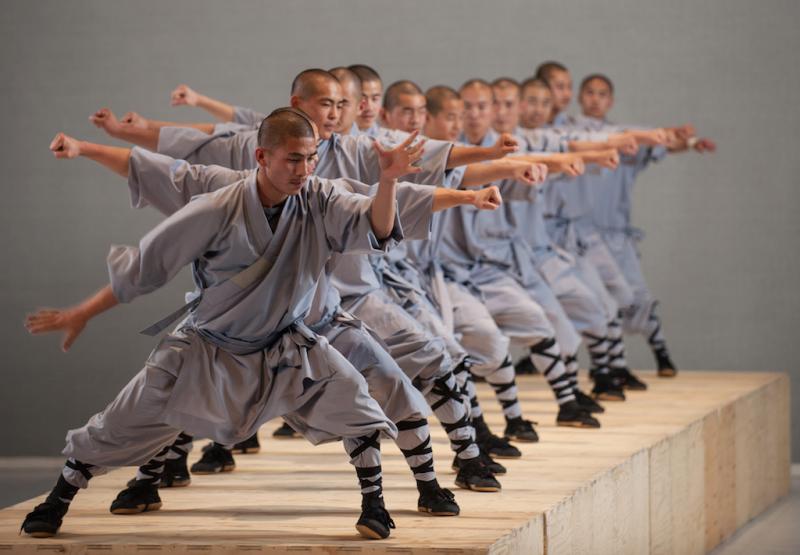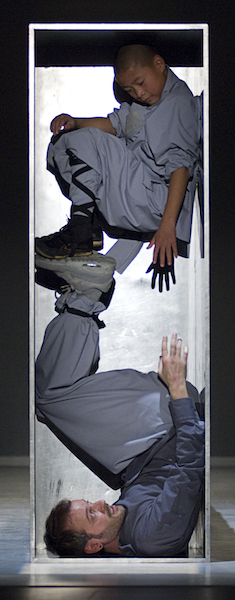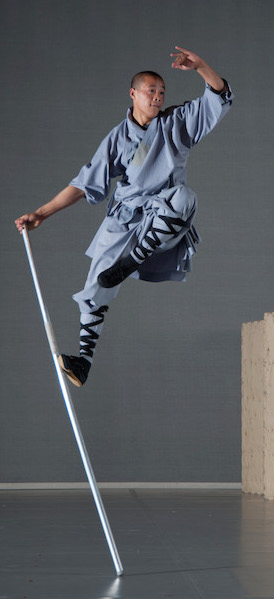Sutra, Sadler’s Wells review – a masterpiece 10 years on | reviews, news & interviews
Sutra, Sadler’s Wells review – a masterpiece 10 years on
Sutra, Sadler’s Wells review – a masterpiece 10 years on
Sidi Larbi Cherkaoui joins the Monks from the Shaolin Temple for a tour that continues to wow audiences the world over

Sutra is back, 10 years after its premier at Sadler’s Wells. This is, in fact, the fourth time it has returned to London and such is the amazing popularity of this beguiling show that, in the past decade, it has been performed more than 200 times in 66 cities in 33 countries.
You can see why it is so successful. The production is clever, funny, skilful and endlessly inventive. Initially the choreographer, Sidi Larbi Cherkaoui performed in it himself; he played the role of an outsider trying to engage with the beliefs and practices of Buddhist monks from the Shaolin Temple in China, who are famous the world over for their expertise in martial arts. His attempts to emulate their prowess are helped by a young novice (pictured below right by Andree Lanthier) who gleefully monkeys around while skillfully mimicking his elders.
 In many ways, the outsider is a self-portrait. Cherkaoui thrives on collaborating with people whose skills and cultural backgrounds differ from his own. He has worked, for instance, with Argentinian tango dancers, a male choir from Corsica who hauntingly sang their way around the stage in Apocrifu (2009) and, most recently, Japan’s Bunkamura Theatre Cocoon who, in Pluto (2018), bring to life various characters from manga comics.
In many ways, the outsider is a self-portrait. Cherkaoui thrives on collaborating with people whose skills and cultural backgrounds differ from his own. He has worked, for instance, with Argentinian tango dancers, a male choir from Corsica who hauntingly sang their way around the stage in Apocrifu (2009) and, most recently, Japan’s Bunkamura Theatre Cocoon who, in Pluto (2018), bring to life various characters from manga comics.
Cherkaoui visited the Shaolin Temple in 2007 and was inspired by the monks’ daily practice of meditating to quieten the mind and training in martial arts to quieten the body. By combining these two contrasting disciplines, they attain a unique balance between spiritual stillness and frenetic energy which, as performers, gives them an extraordinary degree of physical presence.
Sutra is based on kung fu movement sequences which, practised in unison, are akin to a form of physical meditation. Then come demonstrations of individual mastery in fighting bare-fisted or with a staff, which includes leaping up a staff and miraculously balancing on the shaft to the consternation of one's opponent (pictured below left). But no matter how dramatic, an evening devoted solely to martial arts would soon pall, which is why the third element of this dream team plays such a vital role.
To design the set, Cherkaoui approached the sculptor, Antony Gormley who created the Angel of the North and populated Crosby Beach near Liverpool with iron figures that brave the tides. His contribution is brilliant – a simple minimalist set comprised of open boxes large enough to stand up or lie down in. Individually they can become plinths, cupboards, beds, lids or coffins while together they can be used to build a wall, platform, necropolis or Stonehenge. This amazing versatility becomes the source of endless surprises, which remind me of those tests requiring you to invent 40 different ways to use a brick. With his inexhaustible imagination, Cherkaoui would win every time.
 There are some memorable gems, but the comedy is physical and so hard to describe. The outsider, danced here by Ali Thabet, has a box of his own. It lies on its back; he steps inside and disappears bit by bit, as though descending a staircase. He walks round the perimeter with one leg inside the box, which gets him absolutely nowhere; in contrast, meanwhile, the monks effortlessly sweep their boxes into wondrous formations. They line them up like sentry boxes and stand inside having put the outsider at the front. Toppling one after another like dominoes, the boxes jolt the outsider out of his box and off the stage. The monks build a high platform which the outsider climbs onto. They join him one by one until, through force of numbers, they push him off onto the floor. He retaliates by removing one box after another, but the monks are saved by the novice who waits below in a box, like a rescue boat which they all jump into.
There are some memorable gems, but the comedy is physical and so hard to describe. The outsider, danced here by Ali Thabet, has a box of his own. It lies on its back; he steps inside and disappears bit by bit, as though descending a staircase. He walks round the perimeter with one leg inside the box, which gets him absolutely nowhere; in contrast, meanwhile, the monks effortlessly sweep their boxes into wondrous formations. They line them up like sentry boxes and stand inside having put the outsider at the front. Toppling one after another like dominoes, the boxes jolt the outsider out of his box and off the stage. The monks build a high platform which the outsider climbs onto. They join him one by one until, through force of numbers, they push him off onto the floor. He retaliates by removing one box after another, but the monks are saved by the novice who waits below in a box, like a rescue boat which they all jump into.
Sitting behind a translucent screen are five musicians who accompany the action with music by Polish composer Szymon Brzóska. With the help of gongs and other percussion instruments from the temple, he creates a glorious synthesis between eastern and western sounds.
Meanwhile on stage, all ends harmoniously. Thabet, who has studied kung fu, is able to join the monks in their exercises and for a moment, at least, becomes a convincing member of the brotherhood. A degree of reconciliation and a form of understanding between people from disparate cultures is achieved. Without resorting to kitsch, Sidi Larbi Cherkaoui delivers an uplifting message that we can all believe in, if only for a little while.
- Sutra is at Sadler’s Wells on 28 March
- More dance reviews on theartsdesk
rating
Explore topics
Share this article
The future of Arts Journalism
You can stop theartsdesk.com closing!
We urgently need financing to survive. Our fundraising drive has thus far raised £49,000 but we need to reach £100,000 or we will be forced to close. Please contribute here: https://gofund.me/c3f6033d
And if you can forward this information to anyone who might assist, we’d be grateful.

Subscribe to theartsdesk.com
Thank you for continuing to read our work on theartsdesk.com. For unlimited access to every article in its entirety, including our archive of more than 15,000 pieces, we're asking for £5 per month or £40 per year. We feel it's a very good deal, and hope you do too.
To take a subscription now simply click here.
And if you're looking for that extra gift for a friend or family member, why not treat them to a theartsdesk.com gift subscription?
more Dance
 'We are bowled over!' Thank you for your messages of love and support
Much-appreciated words of commendation from readers and the cultural community
'We are bowled over!' Thank you for your messages of love and support
Much-appreciated words of commendation from readers and the cultural community
 R:Evolution, English National Ballet, Sadler's Wells review - a vibrant survey of ballet in four acts
ENB set the bar high with this mixed bill, but they meet its challenges thrillingly
R:Evolution, English National Ballet, Sadler's Wells review - a vibrant survey of ballet in four acts
ENB set the bar high with this mixed bill, but they meet its challenges thrillingly
 Like Water for Chocolate, Royal Ballet review - splendid dancing and sets, but there's too much plot
Christopher Wheeldon's version looks great but is too muddling to connect with fully
Like Water for Chocolate, Royal Ballet review - splendid dancing and sets, but there's too much plot
Christopher Wheeldon's version looks great but is too muddling to connect with fully
 iD-Reloaded, Cirque Éloize, Marlowe Theatre, Canterbury review - attitude, energy and invention
A riotous blend of urban dance music, hip hop and contemporary circus
iD-Reloaded, Cirque Éloize, Marlowe Theatre, Canterbury review - attitude, energy and invention
A riotous blend of urban dance music, hip hop and contemporary circus
 How to be a Dancer in 72,000 Easy Lessons, Teaċ Daṁsa review - a riveting account of a life in dance
Michael Keegan-Dolan's unique hybrid of physical theatre and comic monologue
How to be a Dancer in 72,000 Easy Lessons, Teaċ Daṁsa review - a riveting account of a life in dance
Michael Keegan-Dolan's unique hybrid of physical theatre and comic monologue
 A Single Man, Linbury Theatre review - an anatomy of melancholy, with breaks in the clouds
Ed Watson and Jonathan Goddard are extraordinary in Jonathan Watkins' dance theatre adaptation of Isherwood's novel
A Single Man, Linbury Theatre review - an anatomy of melancholy, with breaks in the clouds
Ed Watson and Jonathan Goddard are extraordinary in Jonathan Watkins' dance theatre adaptation of Isherwood's novel
 Peaky Blinders: The Redemption of Thomas Shelby, Rambert, Sadler's Wells review - exciting dancing, if you can see it
Six TV series reduced to 100 minutes' dance time doesn't quite compute
Peaky Blinders: The Redemption of Thomas Shelby, Rambert, Sadler's Wells review - exciting dancing, if you can see it
Six TV series reduced to 100 minutes' dance time doesn't quite compute
 Giselle, National Ballet of Japan review - return of a classic, refreshed and impeccably danced
First visit by Miyako Yoshida's company leaves you wanting more
Giselle, National Ballet of Japan review - return of a classic, refreshed and impeccably danced
First visit by Miyako Yoshida's company leaves you wanting more
 Quadrophenia, Sadler's Wells review - missed opportunity to give new stage life to a Who classic
The brilliant cast need a tighter score and a stronger narrative
Quadrophenia, Sadler's Wells review - missed opportunity to give new stage life to a Who classic
The brilliant cast need a tighter score and a stronger narrative
 The Midnight Bell, Sadler's Wells review - a first reprise for one of Matthew Bourne's most compelling shows to date
The after-hours lives of the sad and lonely are drawn with compassion, originality and skill
The Midnight Bell, Sadler's Wells review - a first reprise for one of Matthew Bourne's most compelling shows to date
The after-hours lives of the sad and lonely are drawn with compassion, originality and skill
 Ballet to Broadway: Wheeldon Works, Royal Ballet review - the impressive range and reach of Christopher Wheeldon's craft
The title says it: as dancemaker, as creative magnet, the man clearly works his socks off
Ballet to Broadway: Wheeldon Works, Royal Ballet review - the impressive range and reach of Christopher Wheeldon's craft
The title says it: as dancemaker, as creative magnet, the man clearly works his socks off
 The Forsythe Programme, English National Ballet review - brains, beauty and bravura
Once again the veteran choreographer and maverick William Forsythe raises ENB's game
The Forsythe Programme, English National Ballet review - brains, beauty and bravura
Once again the veteran choreographer and maverick William Forsythe raises ENB's game

Add comment